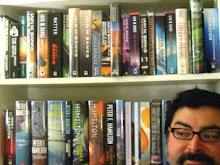I've been meaning to post about all the SF & Fantasy related news I've come across.
Here goes.
Firstly, I attended NORWESCON (they currently have information up for 2011), the Northwest Science Fiction Convention where they announce the Philip K. Dick Award winner every year.
Now, contrary to the other major SF awards in the U.S., the Philip K. Dick Award is chosen by a small committee; the LOCUS award is voted on by the Magazine's readers, the HUGO Award is voted on by attendees of the World Science Fiction Convention (wherever it is held every year), and the NEBULA Award is chosen by members of the Science Fiction Writers of America. That's the first way this award is unique.
The second unique aspect is that it is an award given to paperback originals (trade or mass market). It's set up this way because during Philip K. Dick's lifetime, he was never published in hardback here in the U.S. (in Europe and England, where they 'got' his talent before we did, he had a healthy publishing history). Paperback originals have also traditionally been ignored by some of the more prestigious awards.
So because it is a small committee, voting on often overlooked books, the shortlist is a wonder to behold every year. The awards always surprises; it makes novels go up against short story collections and anthologies, and super-small presses are equally considered along with larger ones.
I was extremely happy in 2004 when a little known book, Life by Gwyneth Jones, published by a tiny local press Aqueduct Press, won the Award that year. The book deserved it, so did the publisher for taking a chance on an interesting topic.
The winner this year was BITTER ANGELS by C. L. Anderson... Nothing against the judges, or the winner, but I was pulling for Daryl Gregory's THE DEVIL'S ALPHABET (mainly because I loved his first novel, PANDEMONIUM so much).
The other major award announcements were the finalists for the Hugo Award:
Boneshaker, Cherie Priest (Tor)
The City & The City, China Miéville (Del Rey; Macmillan UK)
Julian Comstock: A Story of 22nd-Century America, Robert Charles Wilson (Tor)
Palimpsest, Catherynne M. Valente (Bantam Spectra)
Wake, Robert J. Sawyer (Ace; Penguin; Gollancz; Analog)
The Windup Girl, Paolo Bacigalupi (Night Shade)
and the Locus Magazine Award:
Science Fiction Novel
The Empress of Mars, Kage Baker (Subterranean; Tor)
Steal Across the Sky, Nancy Kress (Tor)
Boneshaker, Cherie Priest (Tor)
Galileo's Dream, Kim Stanley Robinson (HarperVoyager; Ballantine Spectra)
Julian Comstock: A Story of 22nd-Century America, Robert Charles Wilson (Tor)
Fantasy Novel
The City & The City, China Miéville (Del Rey; Macmillan UK)
Unseen Academicals, Terry Pratchett (Harper; Doubleday UK)
Drood, Dan Simmons (Little, Brown)
Palimpsest, Catherynne M. Valente (Bantam Spectra)
Finch, Jeff VanderMeer (Underland)
There's some overlap in both awards, but it's exciting since all the authors are extremely talented and if a person were to use these lists as a reading guide, they would have a great time.
Also at Norwescon, I attended a panel titled "Impact of Digital media", which was set up to discuss many of the issues dogging publishers today; Amazon, e-book pricing, etc. During the panel a gentleman named Ben made a statement that blew my mind wide open, to look directly at something that had been simmering in my mind for a while: he was referring to e-books and 'multi-media' books (on the horizon, getting closer thanks to the ipad and some of the things it can do with books). What he said was:
"We need to think of these as different things."
And then it came to me: We do need to think of these things as different; a book, an e-book, a multi-media book, an audio book. It's obvious with audio, but is it really? It's someone reading aloud a book word-for-word, in other words, rather than visually delivering the text, it is being delivered aurally. So in essence, the audio book is like a regular book. It's more tricky with e-books and multi-media books (mmbooks, for convenience). Arguments are raging across the net and in magazines about e-books not being aesthetically designed like books, the idea of mmbooks terrifies fans of the traditional book, but what if, what if:
We started to view all of these permutations as evolutionary branch-off points, like Neanderthals and Homo sapiens?
But you say, 'things' can't evolve. Yes they can. Not on their own, but in concert with humanity. I read a book a long time ago called "The Alphabet Versus the Goddess" which had some startling and exciting theories about literature and human evolution ( I won't go into them here), but the lesson I took away from it was: Whatever humans make, in turn, remakes us. Be it a car, a fabric, a book, a cellphone.
If we start to look at the book problem from this angle, we can begin to separate the divergent 'species' and allow them to evolve in separate directions. Film narrative is a distinct, but no less connected, off-shoot of narratives forged in literature; decades later it evolved enough to create its own narrative devices, which in turn wove their way into the novels of the 20th century.
Let's talk about e-books. But let's truly look at them divorced from the idea of the book
All these mediums are evolutionary branching off points from a original, an Ur-medium; the art of pure story-telling, around fires; each step--cave painting, hieroglyph, abstract alphabet, clay, papyrus, paper, scroll, etc--represents a shift in how stories are told. The book was not borne, Athena-like from Gutenberg's forge; its history is large and its future is ever-changing.
Rather than call this era the end of the book, I declare it the Golden Age, where, challenged by various other forms of story-telling, the book finally comes into its own, solidifies what it means to us, to our future, to our evolution as a species.
Friday, April 23, 2010
Subscribe to:
Post Comments (Atom)

No comments:
Post a Comment